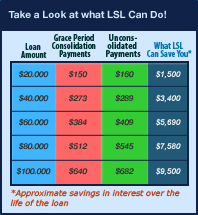 |
Private loan consolidation, like private education loans, has nothing to do with the federal government. In reality, private consolidation loans are just another form of consumer lending such as credit cards. Because of this, private loan consolidations are different from federal loan consolidations.
The main similarity between private loan consolidations and federal loan consolidations is that a lender will pay off your existing private education loans and replace them with one new private loan, so you end up with one lender and one monthly payment.
Unlike federal consolidation, eligibility for private consolidation is credit-based. With private consolidation, everything (whether you are eligible at all, the size of loan you are eligible for, the interest rate, and fees on the loan— literally everything!) hinges on your credit rating or FICO score, a numerical rating ranging from 0-850 that purports to be a quantitative representation of your future credit risk.
To give you an idea, the average FICO score in the U.S. is around 670. How your score is calculated is a very closely guarded secret, but some things that affect your score negatively are not having a credit history, being late with payments, and having too many credit cards or other debt. To get more info on FICO scores, go to http://www.myfico.com/CreditEducation.
The keepers of your credit rating are the three credit bureaus: Equifax, Trans Union, and Experian. Get your credit report from them, read it, and start to watch it like a hawk from now on. If your credit reports contain incorrect information, contact the credit bureaus and ask them to fix it. The power these three companies have over your life is immense; how they calculate your credit rating will in very large part determine your ability to make the large purchases in your life (lease a car, buy a house, etc.).
Each lender is different; but if your credit rating is greater than 700, you should be in good shape in terms of being approved for a private consolidation loan at a reasonable interest rate. If your credit score is below 700, most lenders will allow you to apply with a cosigner and will base their decision on your cosigner's credit. In contrast to federal consolidation, the terms (including interest rate, fees, repayment term) of a private consolidation loan may vary significantly from lender to lender.
The interest rates on private consolidation loans are usually variable rates. The method of calculation varies depending on the lender. However, most lenders will use a “benchmark” interest rate, such as the prime rate, and then add a margin determined by your credit evaluation. The better your credit, the lower the margin. For example, if the prime rate is 6.5 percent and your lender adds a 2 percent margin, your interest rate would start at 8.5 percent for your private consolidation. This rate would go up or down depending on changes in the prime rate. Repayment terms will vary between 10-30 years based on the lender and the amount of the consolidation.
Law School Loans can pre-approve you over the phone for a private consolidation loan in about 10 minutes and advise you of the proposed terms of the loan at the same time. As with credit cards, it pays to shop around; and if you are an attractive borrower, there may be room for you to negotiate the terms of your private consolidation loan with your chosen lender. An additional word of caution: Although you may use the same lender for your private consolidation and federal consolidation, you may not combine the two types of loans into one loan. You will always have a separate payment for each type of consolidation. Consolidating your student loans can save you hundreds of dollars each month and tens of thousands over the life of your loan. With student loan interest rates about to increase in the very near future, it is more important than ever to contact a loan advisor and learn more about your loan consolidation options. You may be quite surprised at how much money you will save by consolidating your loans now.
|
|
 |













 Federal loan consolidations are guaranteed by the government, and they carry the same protections and benefits as your federal student loans.
Federal loan consolidations are guaranteed by the government, and they carry the same protections and benefits as your federal student loans.
